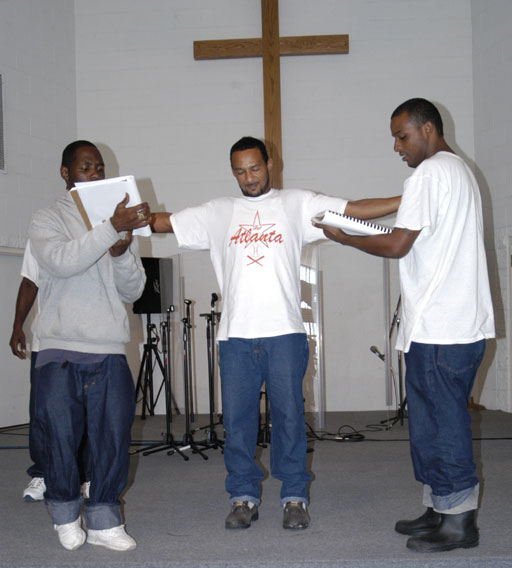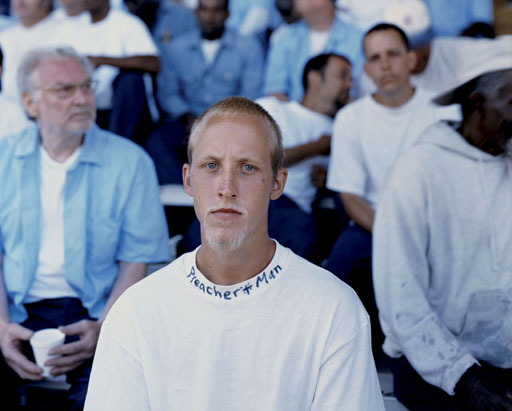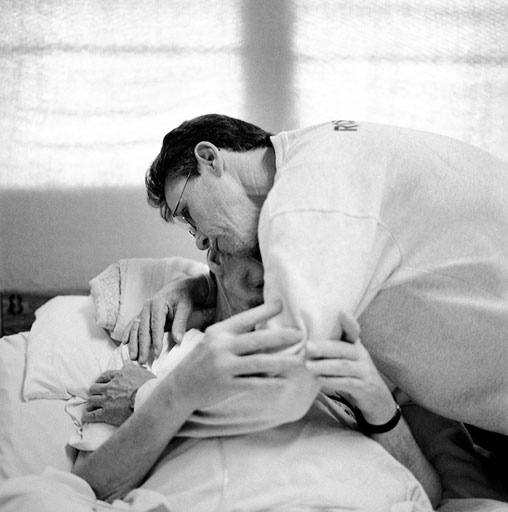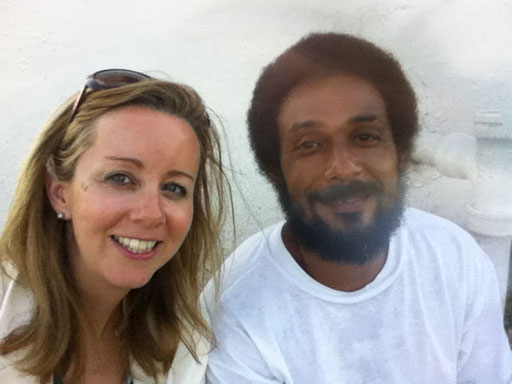
[You can read a response to this article here]
Day one at Louisiana State Penitentiary, Angola, and two major execution rehearsals are taking place. The crucifixion scene for the upcoming play Life of Christ is putting its props to the test out in the rodeo arena as inmate Bobby, playing Jesus, is hauled up onto one of three life size crosses. And a little way off, in an unremarkable single-storey building, devoid of the familiar razor wire that seems to wrap every other building and camp, another group of men gather to walk through the execution by lethal injection that is set to take place the following week.
A correctional officer of the same height and weight as the condemned man becomes stand-in as the strap-down team time how long it takes to fasten him to the gurney and find a decent vein. The officer later, quietly and simply, murmured to me, “I didn’t like it”, as he told of being held down by four of his colleagues while assistant wardens checked logistics and rattled practical questions back and forth over his head. Death is by its nature a lonely place but for this officer, and Bobby too, the experience of being so reviled, even as actors, subdued any insouciant chatter about a subject that permeates the very foundation and existence of this place.
Named after the birthplace of its first slaves Angola was a plantation until it became a penitentiary in 1901, and is now the largest maximum security prison in the US. Home to 5400 murderers, rapists and armed robbers, plus 86 special inmates on death row, the average sentence is 93 years. These men expect to die here. Within living memory that death would more than likely have come courtesy of a fellow-inmate armed with a crude homemade weapon. Men would sleep two in a bunk, splitting the night into two watchman shifts, such was the likelihood of murder in this America’s most bloody and violent prison. All that changed with the arrival of Warden Burl Cain in 1995.
A straight-talking, Southern-drawling boy in the body of a gentle, ambling grandfather with impish eyes and easy grin Warden Cain is a legend not only among his charges but throughout the State of Louisiana and beyond. He follows a brisk succession of Wardens, none of whom could keep the place together, yet in the 17 years since his arrival Cain has combined his simple Christian faith and outlandish vision with phenomenal results.
His ethos is quite simply "moral rehabilitation". “Criminals are selfish people, and religion is the quickest way to turn a selfish person into someone who is willing to find a meaningful existence serving his fellow human beings.” He’s relaxed about what religion they are – “I don’t care!” – but this is the Deep South so when it came to inspiration for the wholescale moral rehabilitation of his charges it was to the Southern Baptist Union that he turned for starters. Government grants for prison education had been scrapped, so the idea of starting a Bible Seminary in the prison was one way to fill a dangerous void and “without moral change you’re just educating them to become smarter criminals.” Within months of the Seminary’s ‘Angola Extension’ starting up the violence had dropped.
Cain was not naïve about the motivations of those signing up for the four year course. “Some of them just wanted to get out of work, some of them wanted to be there because it was air-conditioned, but they can’t sit there for four years learning about Jesus Christ without a lot of them realising they got a calling to be pastors.” Now these pastors are being sent out to other, medium-term jails in Louisiana and across other Southern States. And the authorities are unable to deny the positive difference these men are making, not least to the levels of violence. Among believers and non-believers alike, transformation and meaningful existence are being mediated through service to their fellow inmates with a kind of compassionate authenticity that goes beyond superficial religious dogma.
In the Deep South where a particular biblical rhetoric is prevalent it might be difficult to extricate cultural habit from genuine conversion. What is refreshing is how the religion on offer is not so much an end in itself but a narrative that helps the men glean hope from the actual fertile ground which is the prison itself. Many use a religious language but those who don’t are not precluded from discovering a value to their life that transcends narcissistic parameters. Richard Rohr, the American author of From Wild Man to Wise Man, has written, ‘we are not a healthy culture for boys or men. Not the only reason, but surely one reason is that we are no longer a culture of elders who know how to pass on wisdom, identity, and boundaries to the next generation.

Someone has to give the young male boundaries and identity. He does not get them by himself or without guidance.’ In his quest for morality and civilisation within the prison it seems Cain has inadvertently rediscovered the elemental paths of initiation into authentic manhood, of which contemporary Western culture and religion is so devoid. In old cultures the drawing away into a liminal wilderness experience, an encounter with the possibility of one’s own death, formed rituals which enabled boys to surrender their small plays for power and prestige to the reality of their limitedness. Their confrontation with the ultimate certainty of death becomes a threshold into a life which offers participation in something greater than the egotistical stakes for which boys thought they were living. As Ernest Becker writes in his Pulitzer Prize-winning book, The Denial of Death, until men move into death and live the creative tension of being both limited and limitless, they never find their truth or power.
For those contained within these 18,000 acres, surrounded by magnificent Mississippi swamps on three sides and the hostile Tunica hills to the north, prison provides the contemporary territory for this ego confrontation: what is missing, with a possible sentence of 90 years or more, is an ordinary sense of liminality. There will be no re-entry into the free world. Here the authorities’ bestowal of trust and responsibility is returned to that same community in the form of service and participation. My second day provided a compelling vision of how.
While four years in Bible College does not appeal to everyone, the prison hospice offers others a place not to serve their sentence so much as serve their inmate brothers. As hospice volunteers they work shifts providing basic care for the terminally ill and, when death draws near, keeping unbroken vigil by the patient’s bedside ensuring that they do not die alone. Late at night the volunteers may well be found stitching quilts embroidered with the patient’s name and images of butterflies - the promise of freedom – as a gift to keep him warm and eventually as a pall for his coffin.

Shaheed, a recent volunteer, reflecting on his training to be a hospice volunteer describes being at Angola as “the best thing that could have happened to me.” And he’s not alone in the realisation that though he will in turn likely die here, the prison has given them the chance to live life with a different kind of freedom than the kind they were squandering back in the hood. Shaheed is one of fifteen men with whom I am working as a personal coach. He and the other fourteen lifers are mentors to 60 men who have been sentenced to join Angola’s pioneering Re-entry Programme.
Here the crimes are mainly drug-related - and recurring. Sentences on this programme range from 2-8 years and it’s a rigorous and hopeful existence. Living in a large dormitory the mentors become father-figures to their charges, available 24 hours a day, leading them in daily spiritual devotions and mantras - “I am better than my worst mistake” – before sending them off to classes in welding, horticulture, cuisine, mechanics, or electronics. Evenings are spent with them in a curriculum of ‘life skills’ and cover everything from financial peace to pulling up one’s trousers to create a better impression on future employers. Most of them come in with a 4th Grade education. They leave with a General Education Certificate, a vocational qualification and, for most, the affirmation of having emerged into an authentic experience of their identity, gifts and power.
When I made my pitch to Warden Cain I wrote that, ‘we all live behind some kind of bars. For most of us those are emotional, spiritual and psychological… for your men they are also physical bars. Having a choice about how we’re going to live - even behind prison walls - that is freedom.’ The evening I first meet the 74 young men I remember Warden Cain’s words that most of these guys have been victims of crime as well as being perpetrators. Freedom and forgiveness are a good place for me to start. While I’m not there as a chaplain, on a basic human level everyone in the compound has had to grapple with what forgiveness means and, as Rohr writes, “to forgive ourselves of everything is the deepest kind of death for the ego.” For victims and perpetrators alike forgiveness is a place we would rather not go, but its invitation remains and for those asking the question ‘have I got what it takes to face my own abyss?’ it is ideal territory for realising freedom.
At Angola this initiation into a life of integrity, courage, and freedom is there for the taking. One of them described it as a refining fire that purifies a man like silver. On my last morning Cain asked me whether I thought they were counterfeit. He included himself in that question. I told him however the men choose to respond the choice he affords them is real. For two weeks I worked with the group for 11 hours a day and rarely have I met men more whole and undefended as these.

Religion, I am often frustrated to find, can get in the way of faith, suffocating the thirst for transformation and demand for courage with its superficial promise of personal control. At Louisiana State Penitentiary there are some who continue to choose to live with the hardness of an impenitent heart, some who had to be restrained from throwing faeces through the bars as we walked past. There were also those men who rolled out their neat religious patter in a boring attempt to impress and deflect. What exhilarated were the widespread encounters with those who, having owned their crimes, are transforming the hopelessness of a life sentence into unsung fullness of life. In surrender to the apparent powerlessness of their circumstances, it seems the truth is indeed setting them free.
Convinced? Read a reponse to this article: "Many paths to salvation" by David Belden

